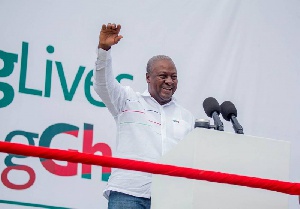 John Mahama is president elect
John Mahama is president elect
Ghana's President-elect, in a recent address, invoked Psalm 23, declaring that God has "prepared a table before him in the presence of his enemies," anointing his head with oil and causing his cup to overflow. This powerful biblical imagery, rich in symbolism and steeped in historical context, offers a compelling lens through which to understand both his personal narrative and the broader political landscape of the nation.
The President-elect's statement is not merely a personal expression of faith; it’s a carefully chosen rhetorical strategy laden with political significance. The allusion to Psalm 23, a cornerstone of Christian faith, resonates deeply with a significant portion of the Ghanaian population. The psalm depicts a shepherd guiding his flock, providing comfort and security, and ultimately leading them to a place of abundance and rest. By associating himself with this imagery, the President-elect projects an image of divine favour, strength, and assured leadership.
The phrase "prepared a table before him in the presence of his enemies" is particularly potent. In the context of a recent election, the "enemies" can be interpreted in multiple ways. It could refer to political rivals, those who actively campaigned against him, or even broader factions within Ghanaian society holding opposing viewpoints. The image of a lavish table set before him, in their very presence, suggests a triumph over adversity, a confident declaration of victory that transcends mere electoral success. It implies not only political dominance but also a divinely ordained destiny.
The anointing with oil, another key element from the Psalm, carries significant symbolic weight. In biblical tradition, anointing with oil signifies consecration, appointment to a sacred office, and divine empowerment. By highlighting this aspect, the President-elect emphasises his perceived legitimacy and divine right to govern. This resonates with the strong spiritual and religious underpinnings of Ghanaian society, lending credence to his claim to leadership.
The final element, "his cup running over," signifies abundance and overflowing blessings. This can be interpreted as a promise of prosperity, stability, and national development during his tenure. It's a hopeful message for a nation yearning for progress and stability, suggesting that under his leadership, Ghana will experience a period of unprecedented prosperity and growth. This is a powerful message of reassurance, particularly crucial in a nation grappling with economic and social challenges.
Ultimately, the President-elect's invocation of Psalm 23 serves as a powerful tool in shaping public perception. It frames his victory not merely as a political achievement but as a divinely ordained event, imbued with spiritual significance. The effectiveness of this rhetorical strategy will depend on his ability to translate this divinely inspired image into tangible improvements in the lives of ordinary Ghanaians.